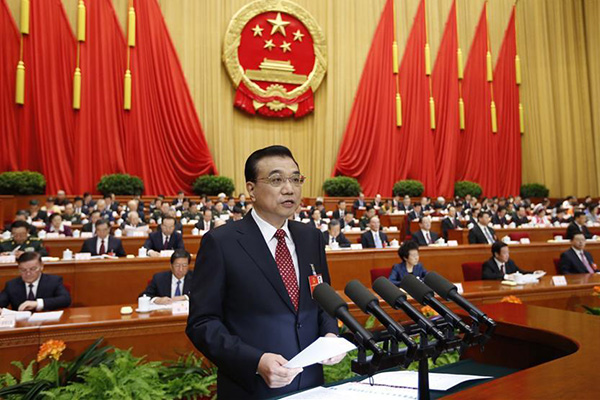 |
|
Chinese Premier Li Keqiang delivers a government work report during the opening meeting of the fourth session of the 12th National People's Congress at the Great Hall of the People in Beijing, capital of China, Mar 5, 2016. [Photo/Xinhua] |
China sets its year-on-year GDP growth rate for this year in a range between 6.5 to 7 percent, Premier Li Keqiang said in a government work report at the National People's Congress annual session on Saturday.
Li said the target is aligned with the country's goal of finishing building a moderately prosperous society in all respects, and takes into consideration the need to advance structural reform.
"It will also help guide market expectations and keep them stable. The aim of maintaining stable growth is primarily to ensure employment and promote the people's wellbeing, and a growth rate of between 6.5 percent and 7 percent will allow for relatively full employment," he said.
Policymakers set a growth target of 7.5 percent for 2014 and 7 percent last year. China has registered the actual growth at 6.9 percent, the slowest expansion in a quarter of a century.
Li said the country faced challenges from both home and abroad in achieving the growth target, as the country was in an economic transition period and the global economy was still in weak recovery.
The lower target range for this year reflects the severe challenges facing Chinese policymakers as they seek to strike a balance between stable growth and economic restructuring, analysts said.
Dong Yanling, an economics professor from Shandong University of Finance and Economics, said that it was necessary for China to keep its growth in an appropriate range while solving many development problems as an emerging economy, the business news website Jiemian.com reported.
The country's economic structural reform and the weak global performance have forced the government to set a lower target that was in analyst expectations, Dong said.
"China has encountered problems in boosting economic growth," said Li Yining, a senior economist and a member of the Chinese People's Political Consultative Conference National Committee. "But these problems can be solved through acceleration of structural reforms," he told reporters on Friday.
Noting that "the employment situation remains sound", Li said he is confident China can achieve its target of 7 percent growth this year.
Deficit ratio at 3% of GDP
In the report, Premier Li said that China pursues a more proactive fiscal policy, increasing deficit-to-GDP ratio to 3 percent this year from 2.3 percent last year. The government deficit for 2016 is projected to be 2.18 trillion yuan ($335 billion), an increase of 560 billion yuan over last year.
Of the deficit, 1.4 trillion yuan will be carried by the central government, and the remaining 780 billion yuan will be carried by local governments, he said.
"The moderate increase in government deficit is projected primarily to cover tax and fee reductions for enterprises, a step that will further reduce their burdens," he said.
He said the government will take measures to alleviate the financial burden on enterprises and individuals by over 500 billion yuan this year. One of the measures is the replacement of the business tax with the value-added tax in all sectors, ensuring "the tax burdens on all industries are reduced."
Cao Heping, an economics professor from Peking University, told reporters that the 3 percent deficit ratio was a general target for the government to manage its deficit, and China has the total government deficit at a very safe level.
CPI at 3%, M2 at 13%
Li also said in the work report that China aims to hold this year's consumer price growth at around 3 percent.
The target is unchanged from that for 2015, but the consumer price index (CPI), a main gauge of inflation, only rose 1.4 percent last year, a six-year low.
Analysts said that reasons behind low inflation include property market downturn, industrial overcapacity and subdued global demand.
Li said China will keep a flexible and appropriate policy in money supply. The growth of the broad measure of money supply, or M2, will be kept at about 13 percent this year. The actual M2 growth last year was 13.3 percent.
Li said the country will keep the RMB exchange rate generally stable while continuing with reforms of exchange rate liberalization.
China will continue to improve the market-based mechanism for setting the RMB exchange rate to ensure it remains generally stable at an appropriate and balanced level, he said.
Defense budget at 7.6%
China on Saturday also announced the country's lowest defense budget increase in six years in the wake of rising economic headwinds and last year's massive drawdown of service people.
According to a budget report to the national legislature annual session, the government plans to raise the 2016 defense budget by 7.6 percent to 954 billion yuan ($146 billion).
The increase last year was 10.1 percent.
Xinhua contributed to this story.